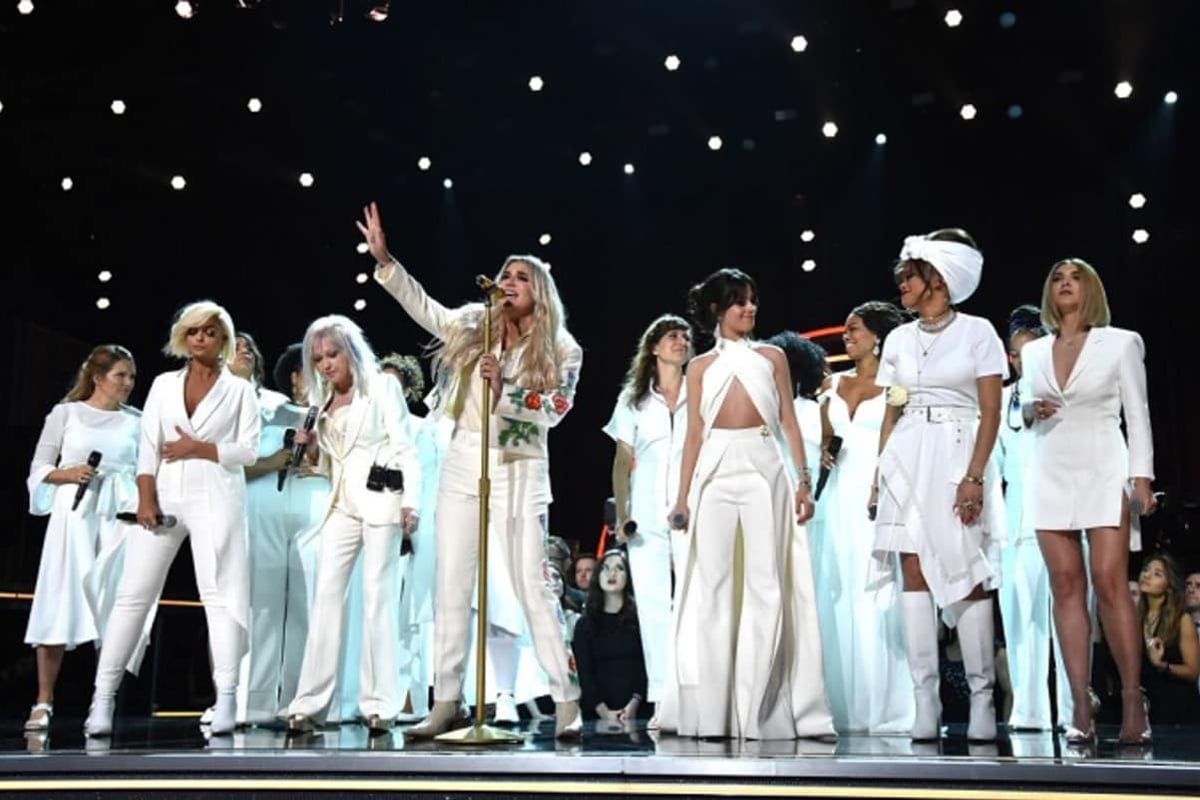Op Ed: Grammys ratings drop as it fails to capture social and music moods

In terms of ratings, it wasn’t good news forthe 60thGrammy Awards.In Australia, metro figures showed the star-studded event failed to make it into the Top 20 shows of the night.
Seven Network broadcast the Grammys live in Sydney and Melbourne at 11.30am and then again at 10pm.
In the US, 19.81 million people tuned in – a drop of 24% from last year. The numbers were the Grammys’lowest viewership since 2009, and the worst tune-in from its core 18-49 demo.
While there were plenty of talking points for those who did tune it, if you rely on Twitter’s figures, the most talked about moment of the Grammyswas Kesha’s rendition of ’Praying’.
Joined on stage by the likes ofCyndi Lauper, Camila Cabello, Andra Day and Julia Michaels, the performance was a message to her alleged tormentor and former producer Dr Luke to sanctify himself.
In a way it was a sublime moment which captured the whole post-Weinstein movement which roared “I’m as mad as hell and I’m not going to take it!”
Female artists dominated Twitter chatter, with Camila Cabello the most tweeted-about artist, while Lady Gaga, Lana Del Rey, SZA and Miley Cyrus were in the Top 5.
At a time when the music industry goes through its biggest social movement ever, the Grammys were asleep at the wheel.
Backstage, there were grumblings that women were under-represented and that the show could have better reflected a commitment to diversity and to social change and consciousness.
There was also the issue that Lorde – whose chart-topping sophmore releaseMelodrama was up for album of the year – was not offered a solo performance.
Instead, she was asked to be part of a group singing ‘American Girl’ as a tribute to Tom Petty. She turned it down.
Grammys executive producer Ken Ehrlich responded that it was a matter of trying to squeeze everyone into a set time schedule and hoping to get the balance right.
There were some who’d argue that a Lorde set would have been a more interesting option than some of the phoned-in appearances from some of the older “legend” acts or most of the tedious comedy routines.
Recording Academy president Neil Portnow added that greater visibility by women on the awards ceremony would come as more women made the decision to join the music industry – and that it was up to the music industry to help them come in.
He commented, “I think it has to begin with women who have the creativity in their hearts and their souls who want to be musicians, who want to be engineers, who want to be producers, who want to be part of the industry on an executive level to step up.
“Because I think they would be welcome,
“I don’t have personal experience of those kinds of brick walls that you face.
“But I think it’s really a combination — it’s us as an industry making the welcome mat very obvious, creating mentorships, creating opportunities not only for women but for all people who want to be creative and really paying it forward and creating that next generation of artists who feel like they can do anything and say anything.”
Going in, it was interesting that none of the four main categories had any white males nominated.
But going out, it was also noticeable that none of the men on the show made any comment about gender inequality and diversity.
There were great live moments, especially as they captured the anger felt about the America that Trump has helped worsen.
With a backdrop of the US flag and military staging,Kendrick Lamarexhilaratingly blasted out on using patriotism marketing and emphasised why Black Lives Matter. The segment ended with his dancers falling to the ground after being “shot”.
Camila Cabello weighed into the immigrant debate by recalling how her parents had arrived with nothing but “pockets of hope.”
Facing audience members sporting white roses to symbolise support for the Time’s Up movement,Janelle Monae delivered a passionate speech on its aims – “And just as we have the power to shape culture, we also have the power to undo the culture that does not serve us well” – before introducing Kesha.
Logic, DJ Khalid and best new artist winner Alessia Cara teamed up for the suicide prevention track ‘1-800-273-8255’, and used the opportunity to add a message to those who felt on the outside.
In terms of the music, too, the members of the National Academy of Recording Arts & Sciences missed the mark in many ways with their predictably conservative voting habits.
Snubbing Luis Fonzi and Daddy Yankee’sLatin track ‘Despacito’ was a major missed opportunity, not only for the song’s own appeal but as a statement of how the streaming phenomenon has changed the rules.
Disappointing too was the failure to acknowledge the chart-topping achievements of the likes of Cardi B, Migos and Post Malone and steer the Grammys away from such a low-risk experience.






























